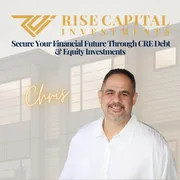Rise Capitals Articles To Educate And Inspire

Why Real Estate Debt Investments
"Risk comes from not knowing what you're doing." – Warren Buffett
When it comes to investing in private real estate debt, thorough evaluation and due diligence are essential for minimizing risk and maximizing return. At Rise Capital Investments, we’ve developed a systematic process to assess every opportunity that comes across our desk. Whether you're investing with us or considering doing this on your own with personal funds, it’s crucial to understand the steps involved, the risks you’re taking on, and how to balance deal flow with capital.
Let’s dive into the steps we follow and discuss the pros and cons of managing your own investments versus leveraging an experienced investment group like ours.

Step 1: Property and Collateral Valuation
In private real estate debt, the property itself is the most important factor. Since our loans are secured by the property (known as "collateral"), we need to ensure that it holds enough value to cover the loan.
Our Process:
We assess the Loan-to-Value (LTV) ratio, a key indicator of risk, which helps us decide how much we’re willing to lend relative to the property’s value. Typically, the lower the LTV, the less risk we take on.
If we are unable to ascertain the value we obtaining a third-party, independent appraisal to confirm the property’s fair market value.
A property inspection is conducted to ensure that the physical condition matches the valuation and that there are no hidden issues like structural problems or environmental concerns.
We also perform a title search to ensure the property has no liens or legal disputes that could affect ownership or resale value.
Lastly we evaluate the project cost based off of historical project data
Why It Matters for DIY Investors: You need to become skilled in property valuation and hire trustworthy appraisers and inspectors. If you lack experience in real estate, this step can be tricky and potentially risky if you overlook hidden issues. On your own, you might also have limited access to top-tier appraisal and inspection services compared to an established group like ours.
Step 2: Borrower and Project Evaluation
Unlike traditional lenders, hard money lending typically doesn’t require credit checks or financial statements from the borrower. Instead, we focus on the borrower’s experience and the feasibility of their project.
Our Process:
We evaluate the borrower’s track record—particularly in similar projects. If they’ve successfully completed multiple renovations or developments, we’re more confident in their ability to execute.
We review detailed project plans, budgets, and timelines to ensure the borrower is prepared and realistic about the project’s scope.
Finally, we look at the borrower’s team (contractors, project managers, etc.) to ensure they have the necessary expertise.
Why It Matters for DIY Investors: Managing this evaluation on your own can be time-consuming and challenging, especially if you don’t have experience assessing real estate projects. Without a proven framework, you might end up lending to someone who lacks the skills to complete the project successfully.
Step 3: Local Market and Economic Conditions
Even if a property is great and the borrower is experienced, the local market can make or break a deal. We analyze the real estate market where the property is located to ensure it’s a strong investment.
Our Process:
We study local trends in property prices, demand, and supply.
We look at comparable properties that have recently sold to gauge if the borrower’s exit strategy (sale or refinance) is viable.
We also examine broader economic factors, like employment rates and infrastructure developments, which could impact property values in the area.
Why It Matters for DIY Investors: Understanding the nuances of local real estate markets requires specialized knowledge. As an individual investor, you may lack the resources and time to perform this level of analysis, especially if you are managing multiple investments.
Step 4: Structuring the Loan Terms
Hard money loans are short-term loans, so structuring the loan properly is key to balancing risk and return.
Our Process:
We set interest rates that reflect the risk of the project, usually higher than traditional loans due to the short-term nature and the typical borrower profile.
Loan terms include provisions for interest-only payments or a balloon payment at the end, and we carefully review these structures to fit the project's timeline.
We implement protective covenants to secure our position, such as ensuring that the borrower maintains adequate insurance and complies with all relevant regulations.
Why It Matters for DIY Investors: Properly structuring a loan agreement is complex and requires legal expertise. If you’re doing this alone, you’ll need to hire a real estate attorney to draft and review your agreements, which can add significant costs.
Step 5: Exit Strategy and Default Protections
A critical part of any real estate debt investment is the exit strategy—how the borrower plans to repay the loan.
Our Process:
We carefully review the borrower’s exit strategy, whether it's through refinancing or selling the property. We ensure their timeline is realistic and that market conditions support the plan.
We also prepare for worst-case scenarios by building in protections in case the borrower defaults. This might include taking possession of the property or working out alternative payment plans.
Why It Matters for DIY Investors: When you manage investments on your own, you’ll need to be prepared to handle defaults, which often involves foreclosure and legal proceedings. This process can be stressful, expensive, and time-consuming without the right support.
DIY vs. Investing with a Group Like Rise Capital
If you’re thinking about managing your real estate debt investments on your own, it’s essential to weigh the pros and cons.
Pros of Doing It Yourself:
Control: You have full control over which deals you invest in and how you structure the terms. (we do offer this flexibility in our portfolio of deals as well)
Potential for Higher Returns: Without a middleman, you could capture a higher return on your capital.
Hands-on Learning: Managing your own investments provides a valuable learning experience.
Cons of Doing It Yourself:
Time-Consuming: The due diligence process takes time, from evaluating properties and borrowers to monitoring projects.
Risk of Mistakes: Without a team of experts, there’s a higher risk of overlooking critical details or mismanaging a loan.
Limited Deal Flow: As an individual, it can be hard to access a consistent flow of high-quality opportunities.
Benefits of Investing with Rise Capital Investments:
Diversification: We have access to a broad pipeline of opportunities, allowing you to spread risk across multiple projects.
Experienced Team: Our team of experts conducts rigorous due diligence on every deal, giving you peace of mind that your capital is being deployed wisely.
Hands-Off Approach: We manage the entire process from start to finish, allowing you to enjoy passive returns without the stress of managing the details.
To learn more about how Rise Capital Investments can help you achieve your financial goals while minimizing risk, visit our website.
By partnering with a group like ours, you can tap into the expertise, resources, and deal flow necessary to build a robust real estate debt portfolio without taking on the time-consuming challenges of managing everything yourself.

